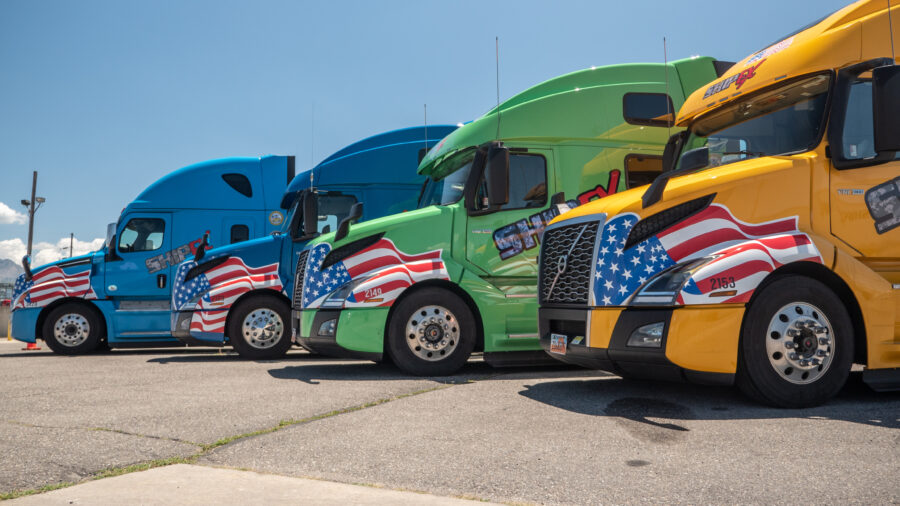Introduction
Understanding how truck drivers get paid is vital for anyone looking to join or better understand the trucking industry. In a field where pay directly impacts driver satisfaction and driver retention, knowing the different payment structures is essential, not only for current and prospective truck drivers but also for those managing fleets and making policy decisions. By understanding the details of pay, drivers can make more informed career choices, and companies can offer better compensation packages.
General Payment Structures for Truck Drivers
Hourly Pay
Hourly pay in the trucking industry is a model where drivers are paid based on the number of hours they work rather than the distance they travel. This pay is most often used for local, or intrastate, truck drivers and is typically associated with strict schedules and daily interaction with customers.
Mile Pay
CPM stands for cost or cents per mile and is how much a driver makes for every mile they drive. The average CPM is between $0.55 and $0.75 and is based on the driver’s experience, the region they are driving in, and the type of goods being transported.
Salary Pay
Salary-based pay in the trucking industry means that the driver is paid a fixed annual or monthly income regardless of the number of miles driven or hours worked. However, some companies may call their pay structure a salary when it is still mile pay, so it is important to find out what your company is offering.
Owner Operators vs. Company Drivers
A company driver operates trucks owned by their employers. Owner-operators are self-employed individuals who own and operate their own trucks. Company drivers are typically paid either by the mile, hour, or on a salary basis via a regular paycheck from the company they work for while owner-operators earn per mile. Company drivers operate employer-owned trucks and focus on transporting goods with any truck-related expenses being paid for by the employer. Owner-operators own their trucks and manage all aspects of their operations, including contracts, route planning, and covering expenses like maintenance and fuel, along with handling administrative tasks such as bookkeeping and taxes. Check out our blog to learn more about how owner-operators get paid.
Pay Variations for Different Types of Hauls
Pay variations in the trucking industry can be significant based on the type of haul. Specialized hauls, such as those involving hazardous materials, often offer higher pay due to the increased risks and additional certifications required.
Additional Compensation Components
As a truck driver, you can look forward to not only your regular pay but also additional compensation depending on the situation. If you are a company driver, the specifics of this additional pay will be outlined by the company you work for, as each company has its own policies.
Detention Pay and Stop Pay:
Detention pay compensates drivers for waiting beyond a specified period, usually two hours, at shipping or receiving facilities. It ensures drivers are paid for delays outside their control. Stop pay compensates drivers for stops beyond the pickup and delivery, covering the extra time and effort required for loading or unloading.
Accessorial Pay:
Accessorial pay refers to the additional compensation that drivers receive for performing tasks outside of their normal driving duties such as loading, unloading, or any other type of extra handling.
Per Diem Pay:
Per diem pay is a daily allowance provided to drivers to cover expenses incurred while on the road, such as meals and other incidental travel costs.
Health Insurance and Benefits:
Companies will offer health insurance and other benefits as part of compensation packages to attract and retain drivers. The range and quality of these benefits can vary depending on the company’s resources and priorities.
Bonuses and Incentives:
Most companies will offer a wide range of bonuses and incentives. From sign-on bonuses at orientation to other bonuses once employed such as safety, mileage, and referral.
The Economics of Owning a Truck
As an owner-operator, you are 100% responsible for your operations. This includes finding your own loads, managing administrative tasks, and covering all repair costs. Unlike company drivers, you operate your own trucking business, which means you must actively seek and negotiate freight, and handle all paperwork and compliance requirements.
Costs for Owner Operators:
Maintenance, insurance, and other overheads. Owning a truck comes with many financial responsibilities. One being maintenance costs, including regular servicing, repairs, and parts replacement. Insurance is another substantial cost as well as fuel, permits, licenses, and taxes.
Revenue Streams:
Owner-operators generate income through different contracts and freight agreements. They can work directly with shippers, or they may partner with freight brokers to find loads.
Profit Margins:
Profit margins for owner-operators can vary greatly depending on how well they manage their costs and secure profitable contracts. While there’s potential for high earnings, profitability hinges on things like fuel efficiency, maintenance, and overall operational expenses.
ShipEX’s True Salary Model: A Standout in the Industry
At ShipEX we offer something called a True Salary. This means that your annual pay will never dip below $62,500 per year. You will have the same weekly paycheck every Friday plus monthly bonus opportunities. Unlike the CPM structure, at ShipEX your paycheck is never impacted by weather conditions or any other industry-related delays. ShipEX’s model provides stability and predictability in earnings.
Benefits for Drivers:
On top of consistent pay, ShipEX offers many other benefits for drivers including taking care of 100% of the driver’s medical premiums. With a driver’s income not solely relying on miles, this makes financial planning and budgeting more manageable for long-term financial commitments like mortgages, car payments, and family expenses. Try our comparison calculator to learn what you could be earning at ShipEX!
- Check out what some of our drivers have to say:
- Steve has been with Shipex since 2015. He says that ShipEX has been “The best company I have ever worked for, hands down”. The same year he started he broke his ankle and the insurance we offer really left him feeling financially taken care of.
- Scott loves that he knows how much he is getting every week and does not have to worry about his bills not being paid. He appreciates the family atmosphere and feels ” A part of the crew”.
- Larry loves the guaranteed pay and not having to worry about a “Bad week or a good week” and his steady paycheck can help him reach his personal goal of buying a home. It has also been beneficial for his wife to know that they will be getting the same amount of money every week, relieving the stress of paying bills on time.
The Future of Truck Driver Compensation
Right now, there is a growing demand for more enhanced compensation packages offered by companies which could outnumber the more traditional pay structures. Recent advances in technology may also lead to performance-based pay, rewarding drivers for their efficiency and safety.
Advancements in technology, like digital logs for truck odometers, provide real-time tracking and precise mileage recording. This in turn boosts efficiency and cuts down on paperwork.
The future of compensation for owner-operators and company drivers is evolving. Owner-operators may see more opportunities for performance-based pay and incentives tied to efficiency. Company drivers might benefit from more regulated pay structures, offering consistent and predictable income.
Conclusion
Understanding how truck drivers are paid is key to making informed career choices and helping companies offer better compensation packages. The most common payment models include hourly pay, CPM, and salary pay. Add-ons such as detention pay, accessorial pay, and bonuses also play a role in overall take home. At ShipEX, we stand out with our True Salary model, offering stable annual pay and excellent benefits, making financial planning easier for drivers and their families.
If you’re thinking about a career in trucking at a company that provides transparent and fair earnings, please check out our employment opportunities as additional resources to learn more about ShipEX and see how we can support your career in the trucking industry.






